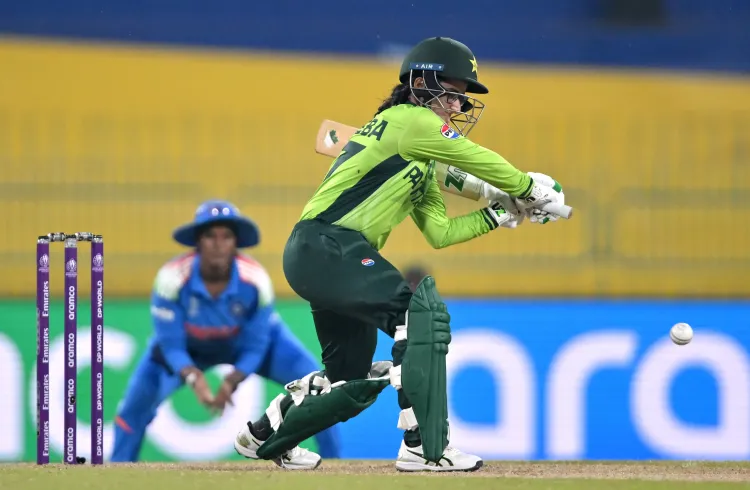Was the MCC Right to Support the Third Umpire’s Decision on Muneeba’s Run-Out?

Synopsis
Key Takeaways
- MCC supports third umpire's decision
- Muneeba's run-out explained under cricket law
- Importance of understanding cricket laws
- Impact of the decision on Pakistan's match
- India's strong performance highlighted
New Delhi, Oct 6 (NationPress) The Marylebone Cricket Club (MCC) has provided a detailed explanation regarding the controversial run-out of Pakistan opener Muneeba Ali during the 2025 Women’s World Cup match against India. The MCC asserts that the third umpire's decision to rule her as run-out was absolutely justified.
The incident unfolded on the last delivery of the fourth over while Pakistan was chasing at the R Premadasa Stadium. Initially, Muneeba evaded an lbw appeal from Kranti Gaud, with India opting not to review, even though subsequent replays indicated three reds.
However, Muneeba had stepped out of her crease, and a throw from Deepti Sharma struck the stumps. Even though Muneeba had grounded her bat, it was still in the air when the throw hit the stumps.
The on-field decision was not out, but a review by third umpire Kerrin Klaaste determined that her bat was airborne when the ball hit the stumps, leading to her dismissal for just two runs.
This decision ignited heated discussions, with Pakistan captain Fatima Sana Khan appealing to fourth umpire Kim Cotton that Muneeba had grounded her bat and should not have been dismissed since she had no intention of running. The MCC, in its clarification on Monday, confirmed that the Laws of Cricket were correctly applied in ruling Muneeba out.
The MCC addressed the argument that Muneeba might have been protected under Law 30.1.2, which states, “a batter shall not be considered to be out of his/her ground if, in running or diving towards his/her ground and beyond, and having grounded some part of his/her person or bat beyond the popping crease, there is subsequent loss of contact between the ground and any part of his/her person or bat, or between the bat and person.”
“This Law implies that if a player is running or diving towards the stumps and has grounded their bat or person behind the popping crease, they are not out if contact with the ground is lost and the stumps are broken afterwards. Muneeba had grounded her bat beyond the popping crease after being hit on the pads, but her bat subsequently lifted. Does this not fit what the Law describes?”
“The answer is no – the Law only applies to players who are running or diving. Muneeba was not advancing towards her ground; she had taken guard from outside the popping crease and did not move her feet back into her ground at any time.”
“This Law, introduced in 2010 and often referred to as the ‘bouncing bat Law’, is designed to protect a batter who accidentally loses contact with the ground while approaching the stumps, whether due to their bat bouncing or their feet being airborne during a run.”
“It does not cover a batter who is turning for an additional run, overbalancing, or in Muneeba’s case, merely lifting their bat. The third umpire was completely correct to declare this Out,” stated the MCC.
The organization further emphasized that Muneeba was rightly ruled as run-out. “It’s a Run out – even though she was not attempting a run, and it was not a No ball, the wicket was not broken by the wicket-keeper without another player’s involvement – it was a fielder’s throw. Therefore, the umpires’ decision stands as Out, Run out.”
As for the match, India scored 247 on a sluggish pitch before bowling out Pakistan for 159, achieving a significant 88-run victory and marking their 12th win over their rivals in women’s ODIs. This victory also propelled India to the top of the points table in the eight-team competition.
India’s triumph was bolstered by three-wicket hauls from fast bowler Kranti Gaud and all-rounder Deepti Sharma, along with a late contribution of 35 not out from wicketkeeper-batter Richa Ghosh and Harleen Deol, who top-scored with 46 runs.
India will next face South Africa at the ACA-VDCA Stadium in Visakhapatnam on October 9, followed by a match against defending champions Australia at the same venue on October 12. Pakistan, on the other hand, will play against Australia in Colombo on October 8.









